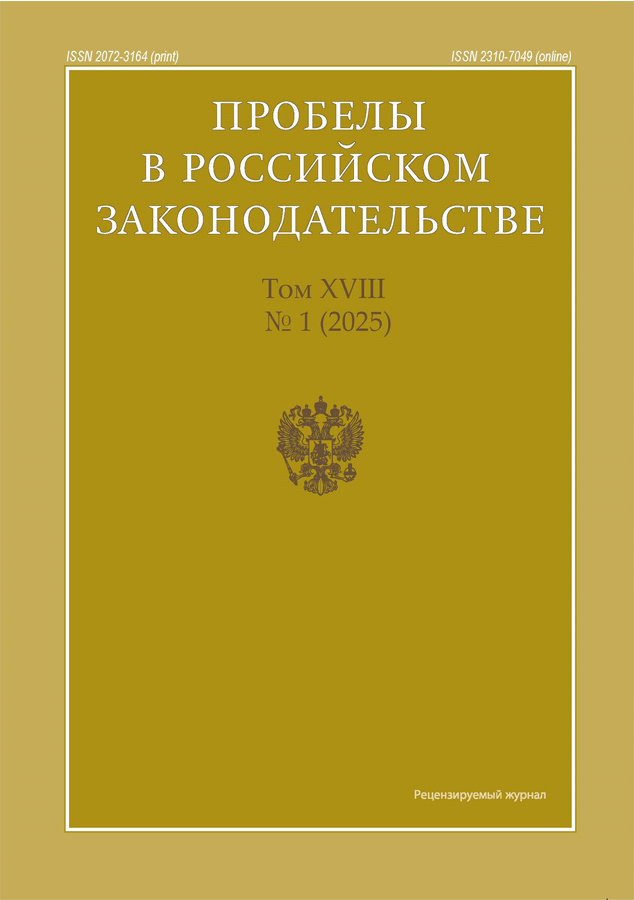Topical issues of methodology of role-playing in teaching (on the example of studying the academic discipline «jurisprudence»)
- Авторлар: Skryachev A.M.1, Zhdanov S.P.2,3,4, Laushkin S.А.1
-
Мекемелер:
- Mozhaisky Military Space Academy
- Plekhanov Russian University of Economics
- Moscow Power Engineering Institute
- Russian University of Transport
- Шығарылым: Том 18, № 1 (2025)
- Беттер: 148-154
- Бөлім: Methodology of teaching legal disciplines
- URL: https://journals.eco-vector.com/2072-3164/article/view/677752
- EDN: https://elibrary.ru/ZRWUGZ
- ID: 677752
Дәйексөз келтіру
Аннотация
The paper is devoted to the analysis of the authors' experience in the formation of cognitive and functional competence, including legal literacy (pre-game stage — given task: contextual and practice-oriented task) in the process of studying a non-core discipline «Jurisprudence» (on the topic «Family Law», which at first glance is not intended to form professional competences). The purpose of the role-playing game is: formation and development of legal literacy as one of the components of cognitive competence of students in educational institutions of higher education. As a result of analyzing the content of the material presented in the article, the authors make some conclusions.
In particular: firstly, the evidence of the use in training of all methodological tools of the concept of contextual learning (here — role-playing game), secondly, the conclusion about the need to model learning through quasi-professional activity of students in the whole range of academic disciplines, wherever it is possible, as built on a scientific basis and experience, such a stage of training with the use of active forms in training and teaching significantly reduces the time and other means in the transition from knowledge and on the basis of active forms of training and learning, fourthly, once again emphasizes the importance of increasing the conduct of classes in the form of role-playing games, which favorably «supports, feeds» such management of professional motivation as the activation of professional interest and the development of educational-professional interactions and interpersonal relations, fifth, from the methodological point of view, the role-playing game can be considered as a method of teaching, but from the point of view of legal status — the role-playing game, as a method, has no right to be called so, because the role-playing game in this case, possessing all the features of the object of copyright (the result of creative work and formalized expression in an understandable form), will not become an object of civil legal relations, which will be subject to copyright (part 2 of article 1255 of the Civil Code of the Russian Federation) by virtue of the rules established by part 5 of article 1259 of the Civil Code of the Russian Federation.
Толық мәтін
Авторлар туралы
Alexander Skryachev
Mozhaisky Military Space Academy
Хат алмасуға жауапты Автор.
Email: askrjachev@ya.ru
SPIN-код: 6393-9660
Cand. Sci. (Law), Assoc. Prof., Senior Lecturer of the Department of Humanities and Socio-Economic Disciplines
Ресей, Sankt-PetersburgSergey Zhdanov
Plekhanov Russian University of Economics; Moscow Power Engineering Institute; Russian University of Transport
Email: zhdanov120009@yandex.ru
SPIN-код: 5309-4333
Cand. Sci. (Law), Assoc. Prof., Associate Professor of the Department of Philosophy, Political Science, Sociology named after G. S. Arefieva, Associate Professor of the basic department «Economic and Legal Expertise», Forensic Expert Union «Expert Council»
Ресей, Moscow; Moscow; MoscowSergey Laushkin
Mozhaisky Military Space Academy
Email: askrjachev@ya.ru
SPIN-код: 7841-6441
Senior Lecturer, Department of Humanities and Socio-Economic Disciplines
Ресей, Sankt-PetersburgӘдебиет тізімі
- Bulanov Y. Y. The significance of the concept of contextual learning A. A. Verbitsky for modern professional education [Electronic resource]. — Access mode: http://sclenceforum.ru > 2018/article/... (date of reference: 25.10.2024).
- Verbitsky A. A. Active learning in higher education: contextual approach: methodical manual. Moscow: Higher School, 1991. P. 207.
- Verbitsky A.A. Competence approach and the theory of contextual learning. Moscow: ITS PKPS, 2004. P. 84.
- Lymarev V. N., Uvarina N. V. Theory of professional motivation and its applied value in modern higher school. Innovative development of professional education. 2021. № 3 (31). Pp. 71–77.
- Model of key competencies of managers and specialists of public authorities: research and justification of application. O. Y. Pereverzina, A. V. Rozhok, L. N. Tatarinova, E. G. Chirkovskaya. Ed. by I. B. Sheburakov Moscow, 2023. Pp. 8–9.
Қосымша файлдар








